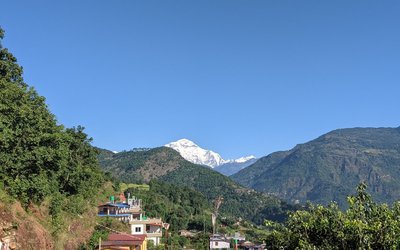After twenty years, the Global Community has once again gathered at Rio de Janerio to see how countries around the world have fulfilled the commitments made by them. Leaders from around the world made several commitments in United Nations Conference on Environment and Development (UNCED) in June 1992. After the Rio, several other conferences on sustainable development held around the world and Nepal too made several commitments. However, all the commitments are yet to materialize. In this context, Rio+20 or Earth Summit 2012 has its own importance. Of course, many of the commitments have been translated into the Millennium Development Goals (MDGs). However, implementation has been a problem. This is the reason the world is facing newer challenges related to food security, energy crisis, global recession and climate change. This entire phenomenon is threatening natural resources. Rio summit is important because it is going to be held at this critical juncture to achieve the goal to secure a renewal of the global commitment for sustainable development, assess the progress and gaps in the implementation of major summit commitments on sustainable development and address new and emerging challenges.
The countries around the world have their own interests and problems. Mountain countries like Nepal have their own problems which are completely different than those of others. The climate change related problems have already created a lot of problems in mountain countries. Despite making significant progress on the policy, legislation and institutional aspects of sustainable development, Nepal is weak in implementation aspects. Nepal has already made several positive achievements in implementing programs related to natural resource management, renewable energy, health, education and poverty reduction. The past experiences have shown that Nepal has the comparative advantage in developing sustainable agriculture, tourism, renewable energy, non-timber forest products, community forestry and bio-diversity conservation. Nepal also hosted the international conference on mountain countries last month. The conference reiterated the commitments to the need to implement the programs benefiting the people living in mountain areas. After the International Conference of Mountain Countries on Climate Change, it issued Kathmandu Call for Action 2012. The Mountain Initiative is an effort towards a coordinated voice for the mountains. It aims to project the needs and concerns of mountain countries and arrive at a framework for effective collaboration for addressing the concerns. As a high level delegation is taking part in the Rio+20 conference, Nepal has found the right time to raise the voice of mountain countries based on the Kathmandu Call for Action. Nepal has identified seven key areas for addressing sustainable development and poverty eradication. They include better jobs, clean energy, sustainable cities, food security and sustainable agriculture, clean water, mountain and disaster readiness.
So far as preparation of Nepal is concerned, Nepal has made very strong preparation for Rio+20 meeting. During my tenure as the vice-chairman of the National Planning Commission about a year ago, I set up a steering committee to prepare the necessary arrangements for Rio. Nepal Status Paper was presented a long time ago highlighting Nepal’s overall scenario. Based on this document, the government has also prepared Nepal’s Position Paper. What the Nepalese delegation needs to do now is to raise the concerns of Nepal and mountain countries.
Nepal has made a major progress in eradicating poverty, reducing inequality, making growth inclusive, creating new jobs and promoting sustainable consumption and production, while combating climate change. Our community forestry program has already proved that community mobilization in natural resources management will bring a drastic change in overall livelihood of the people. Nepal’s natural resource management is also a good experiment to narrow down the effects of climate change. Community forestry can also be effective tool to eradicate poverty. What Nepal needs is to raise the issue and agenda of countries with weak economy like Nepal which are unable to afford expensive technology and high cost. Of course, the countries like Nepal cannot accept everything from the Rio+20 but they can expect that there will be changes in certain degrees.
Main hurdles before the countries like Nepal are how to convince the developed and rich countries that there are challenges to provide the basic needs like food, fuel, shelter, health care and employment for growing populations. Similarly, maintaining human rights, gender equity and environmental justice are also important. Green economy based on sustainable development is important and vital for the protection of the ecosystem. As there is a great hope around the world from Rio+20, it is yet to see how it can endorse a resolution that will show direction for the country around the world.
We have heard many more words from leaders from around the world but only a few steps have been taken to implement them through actions in these past 20 years. The Earth Summit produced Agenda 21, the Rio Declaration on Environment and Development, the Statement of Forest Principles, the UN Framework Convention on Climate Change and the UN Convention on Biological Diversity. After Rio, new institutions were created, including the Commission on Sustainable Development, the Inter-Agency Committee on Sustainable Development and the High-Level Advisory Board on Sustainable Development. But, they have made little impacts. This is the reason there is a high hope on Rio+20.How it will address the concerns of the people remains to be seen.
(Devkota is a former vice chairman of National Planning Commission. As told to new Spotlight)
- TANAHU HYDROPOWER PROEJCT: A Significant Achievement
- Apr 15, 2024
- AMBASSADOR HANAN GODAR: Sharing Pain With A Nepali Family
- Mar 30, 2024
- VISIT OF KfW AND EIB TO NEPAL : Mission Matters
- Mar 25, 2024
- NEPAL BRITAIN SOCIETY: Pratima Pande's Leadership
- Mar 24, 2024
- NEPAL ARMY DAY: Time To Recall Glory
- Mar 15, 2024















